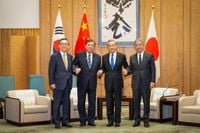On March 21, 2025, South Korea and China made a significant stride toward restoring their cultural relationship during a meeting between South Korean Foreign Minister Cho Tae-yul and Chinese Foreign Minister Wang Yi in Tokyo. The discussions mark a pivotal moment for the bilateral ties as both nations seek to improve their cooperation amid competing regional demands and historical tensions.
Earlier this month, speculation concerning the lifting of Chinese restrictions on Korean entertainment and cultural content began circulating, drawing attention from both nations. According to a statement from South Korea's foreign ministry, the two ministers committed to fostering cultural exchanges that would enhance mutual understanding and deepen practical cooperation. The emphasis on cultural interaction is seen as crucial, especially considering the recent return to diplomacy as an alternative to conflict.
There has been particular focus on China's unofficla ban on Korean pop culture, commonly referred to as the "Korean Wave" or "Hallyu." This unofficial ban reportedly stems from political repercussions following South Korea's deployment of the U.S. Terminal High Altitude Area Defense (THAAD) missile system in 2016. While Beijing has not formally acknowledged the enforcement of these restrictions, they have nonetheless prompted significant concern in South Korea about economic and cultural implications.
Cho Tae-yul articulated these concerns during their talks in Tokyo. He underscored the importance of upholding South Korea's legitimate maritime rights, a topic that took center stage following a two-hour standoff in February 2025. During that incident, Chinese authorities obstructed a South Korean attempt to inspect a steel structure positioned in overlapping waters in the Yellow Sea.
In response, Wang Yi advocated for continued dialogue, highlighting the significance of mutual respect for maritime rights between the two neighbors. This exchange reflects their attempt to navigate complex maritime disputes while working toward improved diplomatic relations. Cooperation on these fronts is increasingly essential for regional stability.
As the talks progressed, both foreign ministers also discussed the potential visit of Chinese President Xi Jinping to South Korea. This visit, expected in conjunction with the Asia-Pacific Economic Cooperation (APEC) summit planned for late 2025 in Gyeongju, aims to serve as a new milestone in improving Sino-South Korean relations. Cho mentioned that if Xi's visit occurs, it could unlock opportunities for mutually beneficial cooperation set to positively impact the livelihoods of citizens in both nations.
Moreover, a bilateral trade agreement focused on enhancing service and investment sectors was part of the discussions. Cho Tae-yul emphasized the necessity for China to adopt a “constructive role” in addressing issues on the Korean Peninsula, particularly in persuading North Korea to cease its nuclear provocations and move towards denuclearization.
These bilateral talks between the two officials are particularly significant, occurring just a day before a crucial trilateral meeting with Japan's Foreign Minister Takeshi Iwaya scheduled for March 22, where broader regional cooperation issues were to be discussed.
Additionally, this was the first meeting that the South Korean and Chinese diplomats held since the emergency martial law incident in December 2024 that had caused a stir in regional affairs. Amid rising anti-China sentiment in parts of South Korea, Cho and Wang's agreement to foster cultural exchanges and expand human interactions aims to mitigate friction and reinforce cooperation.
In a related update, the South Korean government announced on March 20, 2025, the introduction of a temporary visa waiver for Chinese tour groups during the third quarter of 2025, further indicating a warming of relations and a keen interest in increasing tourism-linked discussions.
In concluding their meeting, the officials joined Japanese Prime Minister Shigeru Ishiba, presenting a united front that emphasizes collaboration among the three nations. Their photo opportunity reflects their commitment to a trilateral approach towards tackling shared regional challenges.
While the restoration of cultural exchanges remains a priority, further discussions are anticipated on how these efforts will take shape in the context of China's handling of Korean pop culture and a broader geopolitical situation. The developments following the bilateral meeting hold significant implications for the future of relations between South Korea and China as they work collaboratively towards shared goals and tackling past grievances.
As the dynamics shift, it will be essential for both nations to navigate their historical tensions while fostering a productive dialogue for the betterment of their citizens and the regional community as a whole.

